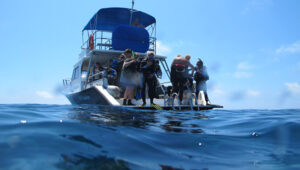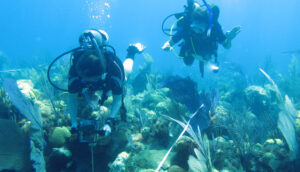Princeton Students Learn Marine Biology at BIOS

For the past nine years, a group of students from Princeton University has traveled to Bermuda each June to participate in a four-week marine biology course offered through a unique partnership between BIOS and the university. Co-taught by Dr. Samantha de Putron (Associate Scientist at BIOS and Visiting Lecturer at Princeton) and Dr. James Gould (Professor of Ecology and Evolutionary Biology, Princeton), the course is an intensive field program that covers all aspects of marine biology. Dr. Carol Gould (science writer) adds a unique perspective as a guest lecturer and—this year—Dr. Penelope Barnes (BIOS Education Director for University Programs) and Kaitlin Baird (BIOS Science Education Officer) also contributed as guest lecturers.
The course includes a variety of fieldwork excursions (e.g., SCUBA dives on various reefs to compare algae and animal distributions, as well as performing a plankton tow, and surveys of the rocky shore and mangrove habitats) that provide students with data to analyze back in the BIOS labs. Additionally, students are able to conduct several laboratory experiments, including investigating the response of corals to irradiance (a measure of solar power) and a study into the effect of water flow on coral feeding. Such experiences provide participants with unique opportunities for hands-on learning that integrates both laboratory research protocols and field research techniques.
While the course looks at all of Bermuda’s marine habitats—open ocean, seagrass beds, coastal zone, rocky shore, marshes, marine ponds, and mangroves—there is a special emphasis on coral reefs and the ecological principles that apply to these unique communities. Dr. de Putron points out that coral reefs are an excellent example to use in teaching a variety of topics, including ecology, physiology, and behavior of resident organisms. She adds, “Teaching this course at BIOS takes full advantage of the close proximity to many marine habitats. This allows us to spend the afternoon at various sites studying the topics we just covered that morning in the more formal lectures.”

Limited to 16 participants, the course is very popular among Princeton students and is always well subscribed, often with a waiting list. All applicants are rising sophomores or juniors and, while the majority are biology majors, the program welcomes applicants from all departments. Over the last nine years the course has accepted students with history, economics, art history, politics, math, English, engineering, computer science, and other non-science majors. From his perspective, Dr. James Gould says, “It is difficult to imagine a better place to teach a course like this. The facilities, colleagues, and resources are terrific.”
For more information on the Princeton Marine Biology summer course at BIOS, please visit the BIOS Summer Courses webpage at /education/summer-courses
